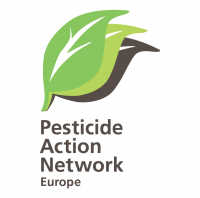PAN Europe carried out an investigation to find out whether pesticides banned in the EU [according to 1107/2009 and PIC legislation1] are detected in food sold on the EU market, using the EU official food pesticide residue monitoring data.
Highlights:
- 74 pesticides - that have been banned for use in the EU because of health and environmental concerns - were found as residues in 5811 food samples (6.2% of all samples tested), the majority being plant-based products (75.2%).
- Exotic fruit sold in Europe such as guavas (85%), goji berries (55%), breadfruit (42%) and cherimoyas (40%) are on the top of the list, together with teas (37%), peppercorns (29%) and coriander leaves (25%).
- The highly toxic fungicide carbendazim, a mutagen substance also toxic to reproduction, is the one which was detected the most (1596 samples), this is more samples than some of the authorised fungicides! Other pesticides, highly toxic to bees or aquatic life such as chlorfenapyr, fenbutatin-oxide, and fenpropathrin were also detected. Our analysis shows that the presence of residues of such pesticides in certain food is in fact legal.
- A high number of different pesticides that have been banned in the EU was detected in food coming from China (30), India (25), Thailand (23), Brazil (13), Vietnam (14) and Morocco (12), among others.
- A recent study by Public Eye and Greenpeace Unearthed revealed that 41 banned pesticides were notified for export from the EU in 2018 predominantly from 7 countries. Our survey shows that at least 22 of those have come back to the EU as they were detected in food consumed in the European market and 19 of them were detected mainly in imported food
Under Farm to Fork, the EU has committed to set a trade policy that supports an European ecological transition and at the same time promotes a global transition to sustainable agri-food systems. Angeliki Lysimachou, Science Policy officer of PAN Europe says: "The impact of hazardous pesticides on human health and biodiversity is global, and the EU must take a lead role in stopping support for any practices that jeopardise human health and biodiversity"
Further, "as a first step the EU should halt the production and sales of banned pesticides and adopt a zero-tolerance approach for such residues in food. Further, pesticide mixtures in food should be urgently addressed. More importantly, all of this should occur alongside the development and promotion of agricultural practices and alternatives to pesticide use that work together with nature and promote biodiversity rather than destroying it".
